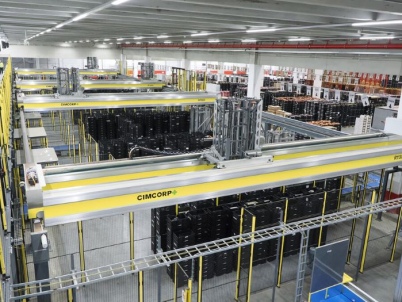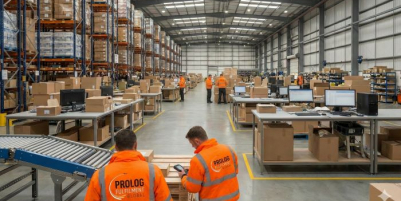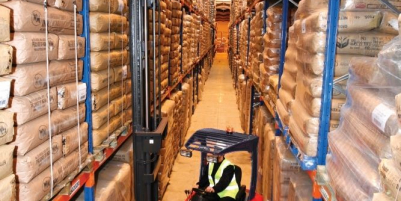-
Rite-Hite unveils new range of hydraulic kits to upgrade and extend dock leveller performance - February 19, 2026
-
REWE and Cimcorp automate fresh supply chain for Berlin supermarkets and stores - February 19, 2026
-
Q1 – A recovery period or time to fix, switch and scale? - February 19, 2026
-
NULOGY’S SHOP FLOOR SOFTWARE TO POWER COMPLETE CO-PACKING’SOPERATIONS - February 13, 2026
-
Why lead generation depends upon good content - February 13, 2026
-
Wallapop and Albatross Sign Strategic Partnership to Bring Real-Time AI Discovery to the Future of Consumer-to-Consumer Commerce - February 12, 2026
-
Thorworld ramp helps Hubergroup to streamline its unloading operation - February 6, 2026
-
TRACKER INNOVATION FROM QUECLINK TO BOOST STOLEN VEHICLE RECOVERY PERFORMANCE - February 4, 2026
-
Flexi Narrow Aisle hits 50! - January 29, 2026
-
DERRY BROS ATTRACTS RECORD NUMBERS OF FREIGHT CUSTOMERS SEEKING CUSTOMS SUPPORT - January 29, 2026
In a new report, experts at commercial energy broker and utilities consultancy Advantage Utilities have revealed exactly what factors businesses should be monitoring and considering to help mitigate soaring energy costs during the uncertain months ahead.
With much uncertainty and volatility present in the energy market, businesses need to remain agile when it comes to ensuring that they’re doing everything possible to manage their energy as efficiently as possible. With an abundance of noise and conflicting advice, it can be difficult for businesses to know which events and influences to pay attention to.
Events last year including an unusually cold winter in Asia, low winds in Northern Europe, hurricane season in the US and an interconnector fire in Kent had a huge impact on the UK’s gas storage and energy supply. According to National Grid, the blaze alone will reduce capacity by about 50% until March 2022. These interconnected events caused concern, confusion and uncertainty for many businesses over what could happen to their energy costs.
Within their newest report, Advantage Utilities identifies the Russia/Ukraine conflict, EU and UK gas storage level and carbon as bullish factors for 2022, with U.S. LNG production, current mild weather and Nordstream2 commissioning as bearish.
Europe relies on Russia for around 35% of its natural gas requirements, therefore the conflict between Russia and Ukraine could be cause for concern in the year ahead.
Commenting on the report, Andrew Grover, Chief Executive Officer at Advantage Utilities said, “Escalating tensions give rise to fears that Russia could effectively ‘weaponise’ gas by restricting supplies to Western Europe in the event that threats to impose economic sanctions are carried out in response to any Russian invasion of Ukraine. Russia has been known to politicise gas supplies in the past.”
He continues: “Whilst the UK hardly imports any Russian gas, we are certainly not immune to wholesale market increases, and should this course of action unfold, the likely impact would be a surge in LNG prices as well as a potential spike in crude oil.”
“However, it is interesting to note that the U.S. is expected to become the largest LNG gas exporter by the end of 2022, and should the present trajectory of supply volume continue, they could become a major contributor to European supplies,” says Andrew.
Surviving soaring costs
Whilst the market continues to be precariously volatile, there are an array of procurement options for businesses which can be used to lessen the brunt, ranging from traditional fixed-term contracts, through to ‘blend and extend’ agreements, quarterly purchasing and variations of flexible procurement strategies. Andrew points out that the suitability of each approach will be dependent on a number of factors, including an organisation’s energy profile, appetite for risk and the importance of budgetary certainty.
“Regardless of procurement strategy, higher wholesale and corresponding grid prices also mean that the financial incentive for on-site generation is greater than ever, with the likes of solar and wind solutions having the additional benefit of reducing an organisation’s carbon footprint. With various funding options available, it may be realistic to implement a solution which drives savings without any capital outlay or ongoing risk,” he says.
In 2022, ESOS III (Energy Savings Opportunity Scheme) audits are mandatory for qualifying organisations. For Andrew, this only escalates the importance of conducting a full energy audit, with the aim of driving improvements in efficiency, engaging with staff and ultimately reducing overall energy spend and being as sustainable as possible.
It is without a doubt a troubling time for business owners across the country, however hope is not lost. There are steps that business owners can take to reduce some of the future impact of rising energy prices this year.
Additional guidance and advice on energy management can be found within Advantage Utilities’ most recent report here.

































